| Friday, April 26 |
| 5:30-9:00 PM |
Registration Open, Ballroom Foyer |
| 7:00-10:00 PM |
Welcoming Reception, Courtyard |
| 8:30-9:30 PM |
Informal Discussion with New Senior Associates
(everyone welcome)
Christine Peterson, Ralph Merkle, Mark Miller, Gayle Pergamit, Mediterranean Ballroom |
| 10:00-11:00 PM |
NiteOwl—Special Interest Groups |
| Saturday, April 27 |
| 8:00 AM |
Registration Open, Ballroom Foyer |
| 8:30-9:00 AM |
Bagels 'n' Caffeine, Ballroom Foyer
Emcee Tom Bell kicks off the conference at 9 on the dot. |
| Saturday Morning Session |
| 9:00-9:30 AM |
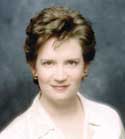 Christine Peterson, Foresight, Mediterranean Ballroom Christine Peterson, Foresight, Mediterranean Ballroom
As Foresight's president, Chris is at the center of the nanotech hurricane. She'll sketch what's happening in the field and what it means for the short term (VC funding, an IP land rush) and the long term (dramatic changes in health, wealth, security, and what it means to be human).
|
| 9:30-10:00 AM |
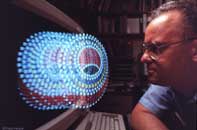 Ralph Merkle, Foresight Ralph Merkle, Foresight
Foresight's VP Technology Assessment and on-staff nanotechnologist explains the "Top 10" recent achievements in nanotech, their significance, and which are likely to make the most difference in moving us toward molecular manufacturing
|
| 10:00-10:30 AM |
Informal discussion, followed by caffeine break in Ballroom Foyer |
| 10:30-11:00 AM |
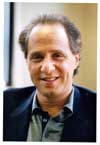 Ray Kurzweil, KurzweilAI.net Ray Kurzweil, KurzweilAI.net
Ray is probably the only winner of the National Medal of Technology to have deeply explored the prospects for advanced nanotechnologies over the coming decades. His projections go beyond revolutionary to mind-boggling -- but his calm, low-key style has helped him insert these radical memes past the mental defenses of many mainstream audiences. Come hear the case for an exponential technology future.
|
| 11:00-11:15 AM |
Informal discussion |
| 11:15-11:45 AM |
 Stewart Brand, Long Bets Foundation & Global Business Network Stewart Brand, Long Bets Foundation & Global Business Network
Ever since founding Whole Earth, Stewart has worked to encourage long-term perspectives and responsibility: "How do we make long-term thinking automatic and common instead of difficult and rare?" Let's hear about his progress on the challenging goal of helping the world to be a less-stupid place for humans and other living things.
|
| 11:45-12:00 PM |
Informal discussion |
| 12:00-1:30 PM |
Lunch (included), Courtyard |
| Saturday Afternoon Session |
| 1:30-2:00 PM |
 Paul Saffo, Institute for the Future, Mediterranean Ballroom Paul Saffo, Institute for the Future, Mediterranean Ballroom
One of our favorite futurists, Paul specializes in looking ahead ten years. He will do that for us first, and then we will tempt him to speculate about what lies beyond.
|
| 2:00-2:15 PM |
Informal discussion |
| 2:15-3:00 PM |
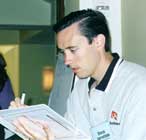 Not Another Nanotech VC Panel Not Another Nanotech VC Panel
Moderator: Christine Peterson
Steve Jurvetson (Draper Fisher Jurvetson), Alan Marty (JP Morgan Partners), Ajay Ramachandran (Ark Venture Partners), and Norm Wu (Alameda Capital) will give their views on where nanoscale technologies are from a venture perspective, what they as funders are looking for, and how would-be nano-entrepreneurs can get their attention. Plus, and possibly most useful: caveats you won't hear at the nanotech business conferences. |
| 3:00-3:30 PM |
Informal discussion with caffeine break in Ballroom Foyer |
| |
Debate of the Decade: BioFuture or MachineFuture?
See which visionary you find more plausible!
Moderator: Tom Bell |
| 3:30-4:00 PM |
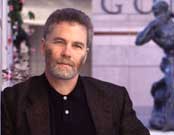 In the next few decades, Gregory Stock foresees widespread reworking of human biology via genetic engineering: neither governments nor religious groups will be able to stop this. Greg sees computer technology as increasingly intelligent, but by and large not integrated with the human body. In the next few decades, Gregory Stock foresees widespread reworking of human biology via genetic engineering: neither governments nor religious groups will be able to stop this. Greg sees computer technology as increasingly intelligent, but by and large not integrated with the human body.
|
| 4:00-4:15 PM |
Ray Kurzweil's view is that by 2030, advances in nanotechnology will enable the routine integration of machine-based computation into the human brain, enabling full immersion virtual reality and a direct interface to forms of nonbiological intelligence. By 2040, the nonbiological portion will be far more powerful than the biological portion: we will have become cyborgs. |
| 4:15-5:00 PM |
Ray and Greg go one-on-one |
| 5:00-5:30 PM |
Audience joins in, creating a (polite) melee |
| 5:30-6:00 PM |
Informal discussion, self-assemble into dinner groups |
| 6:00-8:00 PM |
Dinner on your own, in self-organizing groups
Schmooze while indulging in California's eclectic cuisine. |
| 6:00-8:00 PM |
SpeciaI Interest Groups meet over dinner at local restaurants. |
| Saturday Evening |
| 8:00-8:45 PM |
 Fred Turner, poet/philosopher/sf writer/chaos theorist, Cypress Room Fred Turner, poet/philosopher/sf writer/chaos theorist, Cypress Room
Before the web, before Gutenberg, our species shared information through declamation. Come experience Fred's verbal technology drama and feel it speak to something inside that pre-dates written history. (You know how, when you hear a large crowd sing, it can make your hair stand on end? It's related to that.) A major hit last year.
|
| 8:45-9:30 PM |
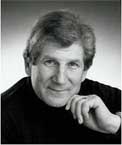 Norm Goldblatt, humorist/physicist Norm Goldblatt, humorist/physicist
By day a mild-mannered optics/semiconductor guy, at night Norm turns into a comedian. Here he'll take on nanotechnology for the first time.
|
| 9:30-11:00 PM |
Open Mike: Your (optional) 3 minutes of fame. Get up and have your say. Informal and casual, but time limits strictly observed! |
| 10:00-11:00 PM |
NiteOwl—Special Interest Groups |
| Sunday April 28 |
| |
Saturday focused mostly on physical technology and money — relatively straightforward compared to the topics of Sunday: information, law, policy, security. In a world with advanced nanotechnologies, design is of central importance, and how those designs are produced, owned, and controlled matters hugely to all of us. And it's time to grapple with the problem of power — possibly radical changes in who has it, and how to head off abuse of powerful new technologies. |
| Sunday Morning Session |
| 8:00-9:00 AM |
Bagels 'n' Caffeine, Ballroom Foyer |
| 8:15-8:45 AM |
 Neil Jacobstein, Institute for Molecular Manufacturing, Mediterranean Ballroom Neil Jacobstein, Institute for Molecular Manufacturing, Mediterranean Ballroom
Executive, environmentalist, Chairman of IMM, and main author of the Foresight Guidelines, Neil is on the front line when it comes to introducing challenging ideas to diverse communities about the feasibility, barriers, risks, and benefits of developing molecular assemblers. We'll hear Neil's latest thinking on how to counteract the growing threat of anti-technology memes.
|
| 8:45-9:00 AM |
Informal discussion |
| 9:00-9:30 AM |
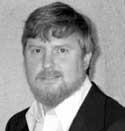 J. Storrs Hall, Institute for Molecular Manufacturing J. Storrs Hall, Institute for Molecular Manufacturing
Josh, an IMM Research Fellow, looks at the problem of thinking machines in "Engines of Contrition -- how to design a robot with a moral sense".
|
| 9:30-9:45 AM |
Informal discussion |
| 9:45-10:15 AM |
 Tim O'Reilly, O'Reilly & Associates Tim O'Reilly, O'Reilly & Associates
A major proponent of open source software and debunker of bogus patents, Tim can tell us his war stories of how bad law is inhibiting creativity, and speculate on what should be done to head off these problems in nanotech.
|
| 10:15-10:45 AM |
Informal discussion, followed by caffeine break in Ballroom Foyer |
| 10:45-11:15 AM |
 Tom Bell, Chapman University School of Law Tom Bell, Chapman University School of Law
What happens when new technologies collide with old laws? Tom has spent years researching and writing about that question. His recent work focuses on how nanotech and other tools can render regulations obsolete--and what to do about it. Hear Tom describe how technological advances can steamroll outdated laws.
|
| 11:15-11:30 AM |
Informal discussion |
| 11:30-12:00 PM |
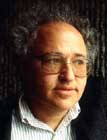 David Friedman, Santa Clara University, School of Law David Friedman, Santa Clara University, School of Law
Trained formally in the sciences and informally in economics and law, David suspects we may face a future combining nanotechnology, machine intelligence, and full-immersion virtual reality, featuring lots of privacy in cyberspace but little or none in "realspace". Can we handle it?
|
| 12:00-12:15 PM |
Informal discussion |
| 12:15-1:30 PM |
Lunch (included), Courtyard |
| Sunday Afternoon Session |
| 1:30-2:00 PM |
Leon Fuerth, George Washington University, Mediterranean Ballroom
Formerly the National Security Advisor to VP Gore, Leon's view is that we are approaching an unprecedented discontinuity in the history of our species: nanotechnology, greatly extended human lifespans, and sentient computational systems. "The future is racing towards us. Vast, far-reaching changes are ahead of us and we had best begin to learn how to think about them now."
|
| 2:00-2:30 PM |
Informal discussion |
| 2:30-3:00 PM |
 Eric Drexler, Foresight Institute and IMM Eric Drexler, Foresight Institute and IMM
Eric sketches his thoughts on what a world with advanced nanotechnologies will look like, how to get there quickly and safely, how to spread the benefits, and how to minimize the downsides.
|
| 3:00-3:30 PM |
Informal discussion, followed by caffeine break in Ballroom Foyer |
| 3:30-4:00 PM |
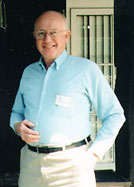 Panel—Can there be Security in a Nanotech World? Panel—Can there be Security in a Nanotech World?
Moderator: Tom Bell
David Friedman, Leon Fuerth, Neil Jacobstein, Patrick Parker (Naval
Postgraduate School), and Eric Drexler debate how to reach a
nanotech world in which humans can have some security.
|
| 4:00-4:15 PM |
Informal discussion, arguments |
| 4:15-4:45 PM |
Eric Drexler, Christine Peterson and other Foresight leaders bring it all together for us—what's coming, what should be done about it, and what about our individual action plans. |
| 4:45-5:30 PM |
Informal discussion; promises to call and email |
| 5:30 PM |
Dash for your plane, or hang around the pool/bar with us |
| 6:00-8:00 PM |
Locals head out to schmooze over self-organizing dinners |
| Back home |
Debates continue on Nanodot.org |